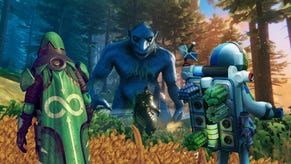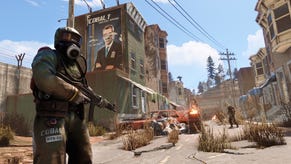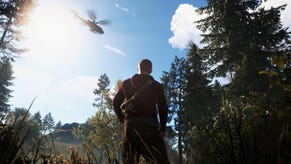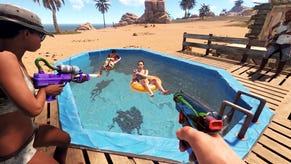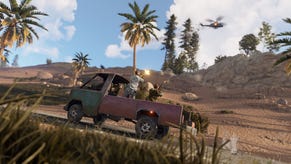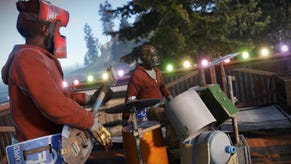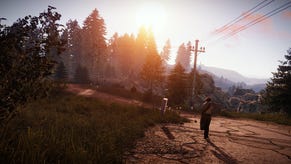Impressions: Rust
Morally Corrosive
I was hunting a deer with a rock, as you do, when I heard a voice.
"We're not going to kill you."
A shot cracked past my head and the deer slumped to the ground. I turned around to see two guys wearing kevlar and toting M4 rifles. Having recently spawned, my offensive options were a stone and some green trousers.
"Take the deer. It's yours."
I scurried over to the corpse like Gollum and began hacking it to pieces with my rock. So delighted, in fact, that I didn't hear the footsteps as one of the pair walked up, took aim, and killed me with a headshot. I heard the laughs though. I clicked respawn, and started over. Welcome to Rust.
Or to be more precise, welcome to the early Alpha version of Rust. The new game from Facepunch Studios, established by Garry's Mod creator Garry Newman, Rust is a mix of survival and crafting that fits in the 'a bit like Minecraft' box. The other obvious reference is Day Z, thanks to the scattered presence of zombies, but this is a very different type of game – and the undead are due to disappear entirely.
Few videogames are sold to the public with a main enemy type that's shortly to be removed, but Rust is that most modern of things: an early-access title. Newman himself says you shouldn't buy it, but over 200,000 people so far have ignored this advice – an astonishing number for a game that isn't finished and hasn't been marketed. A carry-over vote of faith from Garry's Mod, perhaps, or simply the luck of hitting an intersection between several hugely popular titles? We'll return to what Early Access means later, but for now the question is what you get.
Buy Rust's Alpha for $20 and, as is standard, you're also paying for the 'finished' release down the line. At the moment you could say that the game's core elements are in place, primarily the enormous Rust Island. Though it features small towns, and isolated hangars and concrete blocks dot the landscape, Rust Island is a place of empty plains and enormous mountain ranges. The developer-constructed buildings are sparse, because the whole point is for players on each server to construct the world as they see fit.
The first thing I saw that truly impressed wasn't even a building, it was what was around the building. On an open field some team of ingenious and patient builders had constructed a maze-like series of barricaded routes around what was presumably their base. A giant wooden gate blocked off the main entrance, while openings led into further openings and dead-ends that, I noticed, could be seen from the windows of the central building. This was a structure designed for defence, a fortress that allowed its inhabitants easy entry but forced attackers to circle around and walk in front of firing lines. With a decent weapon, you could have held that thing solo.
The only thing that rather ruined the impact was no-one being home to shoot me. And in fact this is a minor theme in Rust, and gives the world almost an ancient quality – the vast majority of structures you come across, great and small, will be abandoned. Buildings also decay over time, and on the long hikes you'll take there are countless follies; half-finished skyscrapers and stairs to nowhere, castles that up-close are facades, and stretches of grass filled with little but foundations and empty storage boxes. Everywhere across these servers are the marks of those that came before.
If this makes Rust sound like a surprisingly contemplative experience, it certainly can be and often is. But it also suffers from the same sort of behaviour that any PvP-focused game does, not least the enormous amount of players who enjoy blowing away newbies on sight. If I'd written this article after two hours of play it would have been all about getting killed over and over again, because that's all that happened.
Such behaviour can't ever be 'solved', of course, but Rust's development will hopefully prioritise the kind of social features that can somewhat mitigate it. Among the major frustrations at the moment is that you can't spawn near your mate, which combined with the fact there's no map and the world is so big means you can play on the same server for hours without finding each other. You also can't give a friend access to a door you've built, and it's possible for cunning players to invite you indoors and then simply lock the door.
I did actually see the funny side of that last one, while committing suicide. And traps, deliberate or otherwise, are surely a major part of Rust's future – not least because certain servers keep your character in-game and 'asleep' when you're not playing. One abandoned building I explored featured a large central staircase, which suddenly terminated at the top over a large pit. Rushing up, I fell and injured myself, and looked around to see four solid walls, a corpse and a bunch of items. Had I stumbled across an old torture chamber? Perhaps the poor sod had just done the same thing as me. Whatever, it was now my tomb. With no escape possible, despite a decent inventory, I had to suicide and abandon that character.
On that note a Steam review of Rust was doing the rounds yesterday, and it's so good I'm just going to reproduce it in full. Cracked it may be, but this also captures what is so intoxicating about this kind of PvP freedom: “I love this game, I built a house around a guy's house and made him my prisoner. I fed him cans of tuna and cooked chicken when it was available, and sometimes I would drop spare logs of wood (when they were available). The best part is he talks to me, keeps telling me his clan's going to raid my structure and save him... I simply respond with 'It puts the lotion on its skin, or it gets the hose again' and by hose I mean I dump charcoal on him. Great game hope the servers come up soon, I think my prisoner may need to eat.”
What can you say to that? Strange meetings are the lifeblood of games like this, and where Day Z has the constant need to visit water sources, here the great focal point is airdrops. Every so often a plane drops three packages which float lazily down on parachutes. These contain top-quality items, the kind of things you don't just find lying around, and so any player nearby makes a dash for them.
Flashpoints can happen anywhere in Rust, but at the airdrops they're guaranteed. The first time I went for one, I was cut down by fire from several angles. The second time, I watched from afar as three tooled-up groups of players fought for control; then as the victors examined their spoils, scavenged the nearest corpses and ran away like a hero. When, eventually, I had the luck to be in a small group near a landing spot and we shared the spoils, it was the beginning of a great afternoon blowing up people's doors with C4.
There's so much in Rust, despite its rough-and-ready state, to talk about – how successful raiding parties quickly turn into hoarding parties, how depressing it is to come back to your house and find it cleaned out (robbing bastards). How acquiring blueprints over time lends an element of persistence to your game, with that crafting knowledge shared across every character; so even though you lose everything sometimes, it becomes easier to build back up.
But Rust is, despite the many positives, an incredibly early version of what could be a fantastic game. That means what is good about it has to be taken in concert with the fact that some elements can bug out (I built one house that killed me every time I respawned in it), some are to be removed (those incredibly frustrating zombies), and many subsidiary elements of the world are placeholder.
What it comes down to, and I think this applies to most early access games, is you have to be time-rich and patient to get at Rust's golden core. For those whose gaming time is a little more circumscribed, things like items falling through the map and glitches that kill your character (infrequent as these problems are) can wipe out a lot of investment and so may well outweigh the pleasure to be had. In other words, Rust needs and will undoubtedly receive a hell of a lot of polishing up. But in a few months' time, nevermind a year? This is going to shine.







